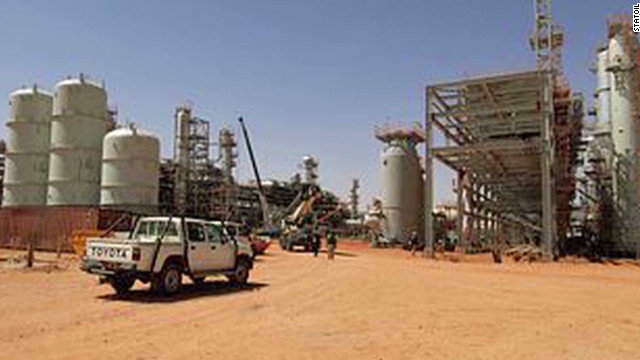Story highlights
- Algerian gas complex attackers may have trained in Libyan jihadist camps, sources say
- Jihadists from Algeria, Morocco, Mauritania, Mali and elsewhere train there, sources say
- Libyan oil fields could now be at high risk of attack, former Libyan intelligence chief says
- A Salafist group in eastern Libya has called for protests over French involvement
The terrorists who attacked the In Amenas gas complex in eastern Algeria appear to have been of several nationalities, and may have trained in jihadist camps across the border in southern Libya, according to sources familiar with the situation there.
Algerian security sources told Reuters late Thursday that the militants whose bodies had been recovered from the complex so far included three Egyptians, two Tunisians, two Libyans, a Malian and a French citizen.
Other sources said the leader of the hostage-taking commando group dispatched to carry out the attack was Abou al-Barra, a jihadist who had previously belonged to the group that later became al Qaeda in the Islamic Maghreb.
A U.S. official told CNN Wednesday that the hostage-takers appeared to have crossed the Libyan border -- some 50 kilometers (31 miles) from the gas complex -- to carry out the attack.
Libyan authorities have been aware for some time of the existence of three militant camps south of the desert town of Sabha, not far from the Algerian border, a regional security source told CNN.
The source said the leader of one of those camps was a Libyan veteran of the 1980s Afghan war.
Western intelligence officials had established that the man had met Moktar Belmoktar -- the overall leader of the group that assigned al Barra to carry out the attack -- during a trip Belmoktar made to Libya late in 2011.
The source said the three camps include jihadists from Algeria, Morocco, Mauritania and Mali as well as ethnic Tuaregs, and that it was highly possible that these camps were connected to the attack.
A former head of intelligence for the Transitional National Council in Libya also confirmed to CNN that he was aware of three camps in the area. Rami El Obeidi said the camps had been operational for about a year and confirmed that foreign fighters had been among the militants training there.
El Obeidi also said that extremist militia in Libya were financing militant groups in Mali and al Qaeda in the Islamic Maghreb as well as providing them with logistical support.
The former intelligence chief said the Libyan army had little capability in this vast area of desert and there was a fear of confronting the extremists.
With the French intervention in Mali, he said "a Pandora's Box has been opened" -- and he believed oil fields in Libya were also at high risk of being attacked.
Foreign oil companies have gradually returned to Libya since the 2011 revolution that ousted Moammar Gadhafi, but much of Libya remains highly insecure and under the sway of independent militia.
A Salafist group in eastern Libya has called for protests after Friday prayers in Benghazi in response to the French intervention in Mali -- posting on its Facebook page that "Mali is bleeding" because of the French involvement.
El Obeidi said that al Qaeda in the Islamic Maghreb treated the whole region as one theater and was oblivious to the desert borders that divided the countries of the Sahel.
North African media have described Abou al-Barra as the one of the most effective commanders of the Al-Mulathameen Brigade that is led by Belmoktar.
He was born in Algeria in the 1970s and served in the Algerian army before joining the Salafist Group for Preaching and Combat, which was heavily involved in the Algerian insurgency in the late 1990s and early 2000s.
The group was held responsible for the kidnap of more than 30 European tourists in Algeria.
A Mauritanian news agency -- Alakhbar -- named another of the attackers killed as Zarghawi Al-Mouritani,18. His real name was Abdallahi Ould Hmeida, the agency said. CNN is unable to verify the report of his death.
The Algerian Communications Minister, Mohamed Saïd, told state media late Thursday that the terrorist attack was the work of a multinational group of terrorists whose aim was to implicate Algeria in the conflict in Mali, destabilize the Algerian state and destroy the Algerian economy, which is heavily reliant on oil and gas revenues.
Other Algerian officials have repeated that there would be no negotiations with such groups.



















